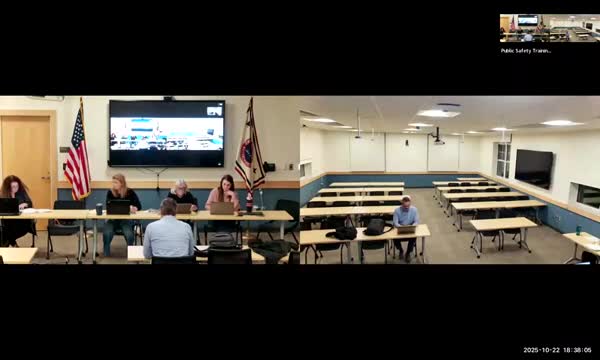Southborough committee debates lowering AMI, seeks clearer accounting as Affordable Housing Trust readies purchases
Get AI-powered insights, summaries, and transcripts
Subscribe
Summary
Representatives from the Town of Southborough Affordable Housing Trust updated the Community Preservation Committee on FY27 transfer requests, said the trust has funds available for quick acquisitions, and discussed potentially targeting lower area median income (AMI) levels while asking the CPC for clearer fund reconciliations and a process for a
The Town of Southborough Community Preservation Committee (CPC) reviewed a Fiscal Year 2027 application from the Affordable Housing Trust on Nov. 9, and heard that the trust now has funds available to act quickly on potential property purchases — but wants clearer accounting and flexibility on future transfers.
The Affordable Housing Trust’s representative, Doug, told the CPC that having funds on hand “has definitely allowed us to actually … be in the game,” describing several rapid property prospects the trust pursued over the past year and three direct resident approaches to sell homes to the trust. He said smaller single-home purchases have often proved impractical and that the trust is focused on seeking larger parcels or multi-unit solutions.
Why it matters: the CPC controls Community Preservation Act (CPA) allocations that the Affordable Housing Trust says it needs to remain competitive in a fast real-estate market. The trust also asked the CPC to consider a process that would convey any CPA funds above an annual $100,000 set-aside to the trust automatically, while keeping the existing town set-aside intact.
Trust finances and reporting: committee members pressed for documentary evidence of current balances and recent reporting to the state. Doug and other trust members said the trust’s balance is approximately $1,002,206.42 as of the June 30 reconciliation provided to the committee, and that about $960,000 of that has been tracked as CPC-source funds in recent reporting. The group agreed to circulate the trust’s annual reconciliation and the housing production plan to the CPC before its next meeting.
AMI, project scale and trade-offs: the committee discussed changing the Trust’s target AMI for future projects from a default of 80% of area median income to a broader or lower range (40–60% was raised). Doug explained the financial trade-offs: lowering AMI reduces sale prices or rents and therefore requires more subsidy. “If you lower the AMI to say 60 percent, they’d only be able to sell it for $200,000,” he said, adding that rental revenue or sale proceeds fall as affordability targets deepen and that developers or the town would need to increase subsidy accordingly. Committee members discussed options including a mix of AMI levels in any single project so lower-income households can be served while improving project feasibility.
Project pipeline and outreach: the trust recounted four recent opportunities they pursued (some formal offers were made but did not reach purchase agreements), and said they are also increasing outreach to developers who can bring state or federal subsidy to larger multifamily or cottage-style projects. Town-owned and constrained parcels such as the water‑tower site were discussed as possibilities, though the trust noted environmental cleanup and neighborhood concerns make such sites complicated. Committee members voiced strong interest in public engagement and in ensuring transparent, early communication when potential parcels are identified.
Process clarifications requested: CPC members asked about the state-required CP-3/DOR reporting and whether the trust’s CP‑3 submissions can be obtained or printed for committee review. Town staff said they would try to retrieve the DOR reporting entry and provide copies of the trust’s spreadsheet reconciliation and any supporting documentation ahead of the Nov. 19 meeting.
Next steps: the Affordable Housing Trust will revise its FY27 supplemental application language to clarify the mechanics of any automatic transfer above the $100,000 baseline, circulate its reconciled fund spreadsheet and the housing production plan to CPC members, and schedule developer outreach meetings for committee review. The CPC agreed to consider the trust’s revised application and documentation at its Nov. 19 meeting.
